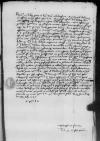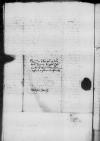Quae post abitum domini ⌊Achatii⌋ hic acta consultaque sint, referet dominus ⌊Alexander⌋, cuius affectiones perdiscet Reverendissima Dominatio Vestra ex colloquio mutuo. Videtur satis constans in studiis erga Reverendissimam Dominationem Vestram, quantum licuit percontari hominem. Iter Romanum videtur affectare, cuius spem ei Dominatio Vestra Reverendissima non excludat: derigendus est a Reverendissima Dominatione Vestra, quemadmodum et in quae loca profectionem instituat.
Consilium meum est, ut reverendissimum dominum ⌊episcopum Plocensem⌋, quoviscumque loco sit, adeat, apud quem summa erit consiliorum nostrorum omnium. Invenietur, opinor, ⌊Cracoviae⌋, quantum hodie ex litteris domini ⌊Ioannis Benedicti⌋ accipimus. Scripsi nunc per dominum ⌊Alexandrum⌋ ad dominum ⌊Theodericum Rheden⌋ admonens, ut incumbat tuendis rebus nostris, quarum condicionem ei declaravi indicavique venturas brevi litteras regias ad ⌊summum pontificem⌋ et ⌊cardinalem Sanctorum Quattuor⌋ in eo negotio. Quod vero nunc praecipue curandum est, admonui prospiceret, ne quod nobis praeiudicium fiat in beneficiorum nostrorum dispositione, quominus liceat Vestrae Reverendissimae Dominationi transferre ius suum, in quem volet, aut mihi mea retinere.
De administratione quoque ecclesiarum obeunda statim post postulationem et praesentationem curaret indultum papae huc mittere, sumptus accipiet ex collatis pecuniis officii notariatus ⌊defuncti episcopi⌋ mutuo, quod et dominus cantor mandavit. Si quid praeterea ⌊Romae⌋ curandum putat Reverendissima Dominatio Vestra, ipsa ad ⌊Theodericum⌋ scribere velit. Scribet et ⌊dominus Alexander⌋, quae ipsa iusserit.
Dominus decanus nulli hominum nisi forte domino ⌊praeposito⌋ indicavit se iturum ad Reverendissimam Dominationem Vestram. Utinam resipuerit et Vestrae Reverendissimae Dominationis votis se iunxerit vel desperans, quamquam ne pili quidem habendum fuerit, etiam si maxime reclamasset. De me autem impediendo, scio, non facile mutabit consilium et conatum nec dubito ⌊eum⌋ apud Vestram quoque Reverendissimam Dominationem frigidam suffudisse, sed suo malo torquetur invidia. Deus est, qui omnium habet potestatem. Mihi solatio est, quod video hic me ab his tantum non amari, qui putant a me bolum sibi e faucibus ereptum, sed valeant.
Commendo me amori Reverendissimae Dominationis Vestrae, quam Deus servet felicem.

